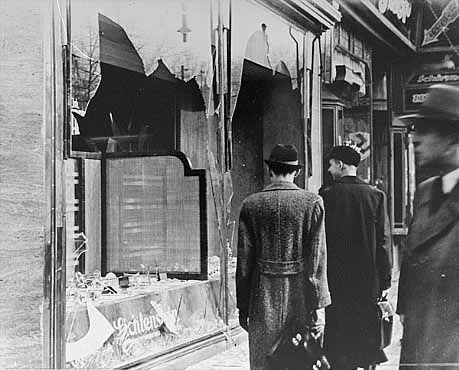By: Cassandra & Salma
It was a peaceful and quiet night on November 9, 1938 when the Nazi regime swept across the streets of Germany in a plan to terrorize and persecute innocent Jewish people. The Nazi's dubbed the unfortunate night Kristallnacht, the "Night of Broken Glass".
Fact: Many Jewish people demote the use of the term Kristallnacht because of the Nazi origins and what it cost; feeling that the significance of the night was not the destruction of property or shattered crystal but the spark of Anti-Semitism on a continental scale.
It signalled the reign of terror that was to come, as insurmountable amounts of violence were unleashed on the Jewish population, killing over 91, injuring hundreds and escorting over 30,000 people to concentration camps. Jewish shops and houses had been marked in slurs, broken down and looted while synagogues crumbled down in flames.
Fact: Approximately 300 religious congregation halls, known as synagogues, were burned down in flames - many of which were historical structures.
"Many Jewish establishments were being surgically smashed and looted when there was a clatter of knuckles on the apartment door... [Max's father] looked at the faces, naked with fear, turned the lock and opened the door. As expected, it was a Nazi. In uniform" (Zusak, 192-93).

Many who were not a part of the regime joined in the riots, while a majority of people simply stood watching or passed by, turning a blind eye to the horror. The people had been marked; armbands with the infamous yellow Star of David, printed Juden. They were forced into the streets to parade their shame.
Fact: The Jewish people of Germany were fined 1 billion marks for the mass destruction of property in Germany on Kristallnacht.
That night, the Jewish people were made outcasts in their own motherland; strangers to their own soil. The Jewish, who were able to escape the fate, were those who had gone into hiding or escaped Germany for countries of refuge such as England or the U.S. These people who lived are still traumatized by the horrific night up to this date. They consider themselves "one of the lucky ones" but still experience the fear and regret of others who suffered - their own people, with innocents who perished.
"'Come on.' Walter pulled at him as the rest of the family said their goodbyes...'It's chaos out there, and chaos is what we need'" (Zusak, 194).



Why have you posted a picture of Soviet troops in Berlin under the heading "Kristallnacht"?
ReplyDeleteCheck your sources!!